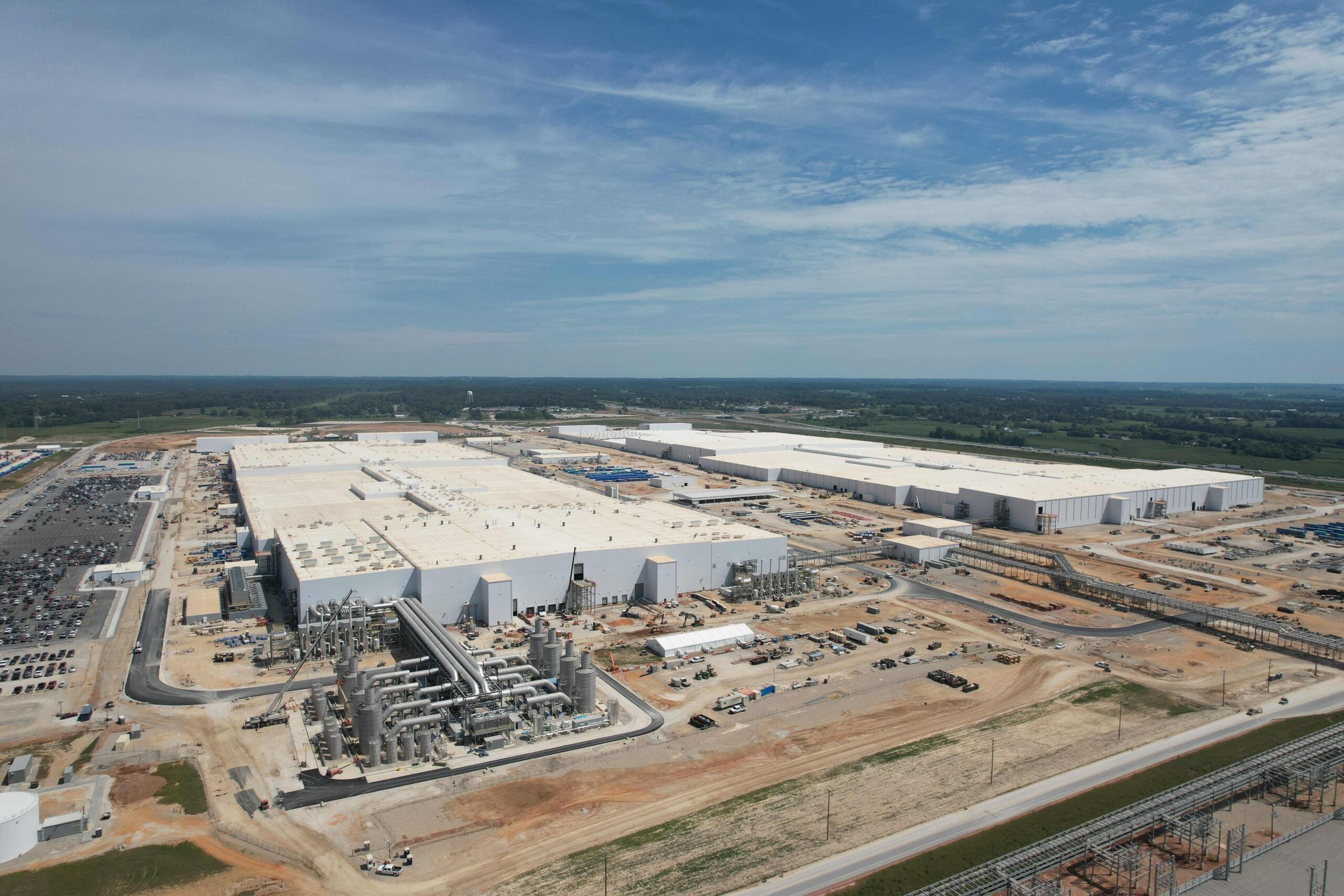Halee Hadfield can recall exactly where she was when the fire broke out at BlueOval SK Battery Park in Kentucky’s Hardin County. It was her day off from working in quality control at the company, a joint venture between Ford Motor Co. and South Korean company SK On that supplies electric batteries to the U.S. automaker. Hadfield swiped over to the union organizing committee group chat on April 27, and saw 30 or 40 messages. She thought, “Oh shit, here we go.”
A fire had broken out near a series of massive vats holding flammable chemicals. Although nobody was hurt, many of the plant’s approximately 1,050 Kentucky workers were shaken by the experience: confusion over where to go, no fire alarms going off, and a general sense of chaos. Hadfield, who is part of a unionization effort with the United Auto Workers at the plant, recalled talking to her wife and parents as messages rolled in. “We’re all just kind of sitting there like, what’s it going to take for this company to actually care about the people who work here?”
More to the point today, say workers, is what it will take to actually get a fair union election and, eventually, a contract to improve their jobs. Employers can now introduce almost infinite delays in the process as a result of Trump administration changes at the National Labor Relations Board.
* * *
On Jan. 7 of this year, six weeks after UAW officials announced that a majority of BlueOval SK workers had signed union cards, the workers filed for a union election with the National Labor Relations Board. At the NLRB, which administers labor law, the median wait between petition and election under the Biden administration was 31 days. But it was not until June 26, nearly six months after workers had requested an election and five months after Donald Trump took office, that the board even ordered BlueOval SK to hold one. An election date has not yet been set.
“A lot of my co-workers just want an election. They’re ready to vote,” Bill Wilmoth, a formation production operator and part of the volunteer organizing committee, told Capital & Main in June.
The election delay began when BlueOval SK responded to workers’ election request by filing an NLRB complaint. The company argued that current workers represented too small a share of the eventual workforce at the plant to gain standing as a union.
During that delay, BlueOval SK has worked to block the union. This winter, BlueOval SK paid LRI Consulting Services, a firm known for sending anti-union staff to trail retail workers at their jobs, $425 an hour to hold informational meetings with workers. BlueOval SK’s legal representation, Frost Brown Todd, has a website page devoted to “union avoidance/campaigns” offering “campaigns that empower employees to vote ‘no’” on a union. The company also spent $17,229 on ads targeting Kentucky audiences through Meta, the parent company of Instagram and Facebook, between April 6 and July 4. The ads include a video urging workers to “tap the brakes” and “vote no” on the union.
BlueOval SK did not return requests for comment.
Multiple workers who talked to Capital & Main say they’ve been driven to organize because of workplace injuries and threats to health and safety. Workers have filed multiple safety and health complaints, and reporters from The Louisville Courier Journal extensively documented workplace injuries, mold contamination, bat infestations and chemical exposure risks.
That’s driven workers to demand a fair election, said Wilmoth, but the company’s anti-union efforts have taken a toll. “They’re smart enough to figure out their environment and what’s best for them,” he said of co-workers. But the company’s opposition means “they’re very hesitant to have discussions” openly about unionization, he added. Workers say management has pulled employees aside for “conversations” and told them to attend meetings that some workers did not know were anti-union meetings until they got there, while new hires have reported experiencing anti-union rhetoric during training.
The UAW has filed six unfair labor practice complaints with the NLRB, including as recently as July 2. The union alleges that BlueOval SK threatened, restrained and coerced workers through destroying union materials shown in nonwork areas; threatened closure of the facility; and fired workers for supporting the union.
In May, an investor group sent a letter to Ford’s board of directors detailing concerns over BlueOval SK engaging in “union avoidance activities.”
* * *
BlueOval SK workers are confronting perennial problems exacerbated by the Trump administration at the National Labor Relations Board: Insufficient funding and employers leveraging bureaucratic delays to undermine unionization.
The agency is facing cuts under the Trump administration, exacerbating longstanding complaints from leadership that the agency is understaffed and underfunded — even as caseloads have grown. This April, The Guardian reported that the agency had terminated leases on seven local offices. In May, the NLRB’s 2026 budget reduced agency spending by nearly 5% in order to address requirements of Trump’s executive order on “government efficiency.” The drop cut $14 million and 99 staff from the agency, most of it from the handling of cases.
Employers also know that delays are likely to hurt union efforts — and have a “toolkit of tactics,” according to Kate Bronfenbrenner, director of labor education research at Cornell University’s School of Industrial and Labor Relations. That includes threats of job loss or closure, surveillance of workers, captive audience meetings or one-on-ones with supervisors. But delay is one of the most effective, Bronfenbrenner said. “When people file a petition, they do it with hope and courage,” she said. “When delays persist and workers are facing constant threats that scare them out of organizing, it can shift to ‘I don’t know if this is worth it.’”
Resolving disagreements like the one between BlueOval SK and its workers is the job of the National Labor Relations Board, but the federal board has been effectively frozen since President Trump’s Jan. 29 firing of board member Gwynne Wilcox. (Trump noted that Wilcox was “disfavoring the interests of employers.”) Wilcox sued over the firing, leaving the case bouncing between courts; in May the Supreme Court indicated it would uphold her firing when the case reaches its bench. Wilcox’s absence has left the federal board without the quorum required to function.
A dead end at the federal level gives employers a nearly bottomless source of delays to union efforts, said Margaret Poydock, senior policy analyst with the Economic Policy Institute. To that end, employers including SpaceX and Amazon have begun filing petitions with the National Labor Relations Board arguing that the agency itself is unconstitutional. Others have argued that, without quorum at the federal level, regional NLRB offices cannot schedule elections. Every new filing increases the likelihood of a delay.
“Delays at the NLRB can disrupt the momentum of union organizing campaigns and workers’ ability to hold their employers accountable for violating labor law,” said Poydock. Trump’s firing of Wilcox “created the expectation that future board members are expected to side with employers over workers,” she said.
* * *
On July 1, five days after the NLRB rejected BlueOval SK’s argument and ordered the election, the UAW issued a press release urging the agency to investigate the company for union busting before setting an election date.
Meanwhile, representatives for BlueOval SK told media that the UAW’s call for an investigation is designed to “thwart the election process.”
In Hardin County, workers say they’re undeterred.
“Yes, I was hoping to have a quick election,” Hadfield said in June. But regardless of the delays, “I’m in it for the fight.”
Copyright 2025 Capital & Main


 Column - State of InequalityJanuary 29, 2026
Column - State of InequalityJanuary 29, 2026
 Latest NewsFebruary 3, 2026
Latest NewsFebruary 3, 2026
 Dirty MoneyJanuary 30, 2026
Dirty MoneyJanuary 30, 2026
 Featured VideoFebruary 4, 2026
Featured VideoFebruary 4, 2026
 The SlickFebruary 2, 2026
The SlickFebruary 2, 2026
 Column - State of InequalityFebruary 5, 2026
Column - State of InequalityFebruary 5, 2026
 Column - California UncoveredFebruary 6, 2026
Column - California UncoveredFebruary 6, 2026
 The SlickFebruary 10, 2026
The SlickFebruary 10, 2026

